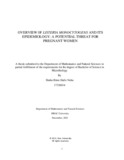Overview of Listeria monocytogens and its epidemiology : a potential threat for pregnant women

View/Open
Date
2021-12Publisher
Brac UniversityAuthor
Neha, Shaba Binte HafizMetadata
Show full item recordAbstract
Listeria monocytogenes is a Gram-positive intracellular, aerobic, and facultative anaerobic bacteria that is mostly transferred to humans through food. Thousands of people have died as a result of listeriosis outbreaks. Although LM can occur in asymptomatic pregnant women, fetal infection is a dangerous illness that can result in early birth, abortion, sepsis, CNS involvement, or even death. If a pregnant woman experiences symptoms like fever, headache, diarrhea, myalgia, or other digestive-related symptoms, it's nearly like she has influenza. Positive cultures from maternal or neonatal blood, neonatal cerebrospinal fluid (CSF), amniotic fluid, intrauterine mucosa, or the placenta can be used to diagnose listeriosis. For LM pregnant women without allergies, two weeks of high-dose intravenous amoxicillin (more than 6 g/day) is advised. If maternal and fetal problems worsen, it may be necessary to terminate the pregnancy to save the mother's life. Listeria infection in newborns is primarily transmitted through the placenta, and it is a serious sickness with a high fatality rate. Dietary recommendations for pregnant women can help to minimize the rate of pregnancy-related listeriosis.
